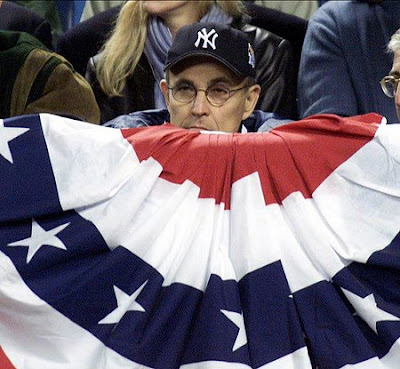
The New York Times
May 12, 2007
About New York
The Rings of Giuliani
By JIM DWYER
Rudolph W. Giuliani, who after deep reflection has concluded that he is the best qualified person in America to be president, now owns four gold World Series rings, which, if hit hard enough with a hammer, would yield about 100 diamonds, some of them a half-carat in size.
The rings were created by the New York Yankees baseball team to commemorate their championships from 1996 to 2000. Mr. Giuliani says he bought them fair and square for a total of $16,000 — “I paid precisely what anyone else would pay” — and that he scored the baubles only after he left office.
Well.
Actually, he could not have paid what anyone else would pay because the team does not sell the rings to anyone. The whole point of World Series rings is that they cannot be bought. Moreover, on the rare occasions when they have gone on the private market, they have drawn prices many times what Mr. Giuliani paid the Yankees.
Still, as endlessly fascinating as money and jewelry can be, they are but accessories to the ego.
During his eight years in office, Mr. Giuliani played the role of First Fan of the Yankees, a kind of team mascot perched in the best box seats in the ballpark, his image glimpsed just over the shoulder of some Yankee star whenever TV cameras pointed to the on-deck circle.
How much and when Mr. Giuliani paid for those choice seats is apparently a complicated state secret: The Yankees say they did sporadically receive checks from him for his tickets, but they won’t say for how much or how often. Mr. Giuliani’s spokeswoman said he paid “thousands of dollars” when he was not at games on “official business,” a term of liberal elasticity.
As mayor, he actually did have one large piece of official business involving the Yankees: He served as the team’s landlord. Yankee Stadium was built and paid for by the people of New York, and is part of the Parks and Recreation Department’s portfolio. The Yankee baseball team is a tenant of the city.
For naked obstructionism, for sheer contentiousness — for late payments, underpayments, no payments — the Yankees have few peers among long-term occupants of city property. One year, the team tried to lower its rent by claiming that it had paid an engineer — one man — to work 168 hours a week for six straight weeks. That is the numerical equivalent of 24/7. In seasons when millions of people arrived, the team managed to pay less in rent for the use of Yankee Stadium than the residents of the nearby St. Mary’s public housing project paid in a month.
During Mr. Giuliani’s last years in office and into 2002, the team tried to get out of about $3.5 million in rent by shaving the revenue it reported for concessions, ticket sales and cable income, and by trying to claim deductions for money it owed to Major League Baseball. These maneuvers were spotted by the office of City Comptroller William C. Thompson Jr.
The Yankees may have 26 championships, but no one has ever given the team a gold ring for being good tenants.
Nevertheless, in his final hours in office, Mr. Giuliani, the landlord/First Fan, helped the team by approving amendments to its lease with the city, including one signed on the steps of City Hall while bagpipers played a final salute to the mayor, as Wayne Barrett reported in this week’s Village Voice. These were quickly rescinded by Mayor Michael R. Bloomberg when he took office.
Mr. Giuliani, now a wealthy man, probably does not need to make sweetheart deals for jewelry, even if that’s what his transaction with the Yankees looks like. The 1996 Yankee World Series ring, with a half-carat diamond at its center and 23 diamonds around the outside, was described in published reports in May 1997 as being worth $8,000.
Mr. Giuliani paid $2,500 for his seven years later, which is what the ring cost the team, said Alice McGillion, a spokeswoman for the Yankees. For the three other championship rings, the Yankees say Mr. Giuliani paid the team’s cost, a total of $13,500. But reporters were told years ago that the 1998 ring by itself was worth $15,000.
The rings and free tickets are a reminder of a quality that overtook his administration in its final years: the common human fallacy of infallibility. Whatever good guys did was, by definition, good. We do it, therefore, it’s O.K.
E-mail: dwyer@nytimes.com
No comments:
Post a Comment